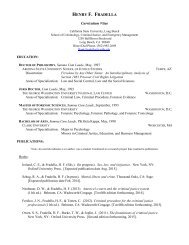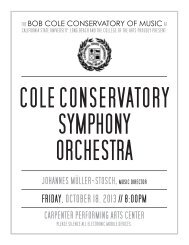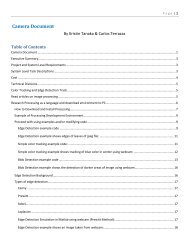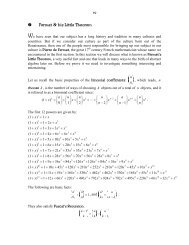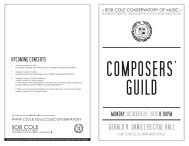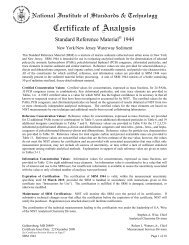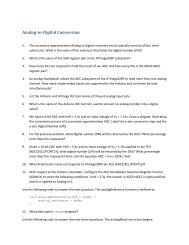Untitled - California State University, Long Beach
Untitled - California State University, Long Beach
Untitled - California State University, Long Beach
You also want an ePaper? Increase the reach of your titles
YUMPU automatically turns print PDFs into web optimized ePapers that Google loves.
of completely realized absence - nothing was to be found (www.<br />
harpercollins.com).<br />
As a result of finding nothing, not even a woman like Lista as Jonathan<br />
does in his novel, Foer creates a fictive history of Trachimbrod woven<br />
with elements of magical realism and myth. Part of that narrative is a<br />
fictional representation of himself.<br />
The technique of using elements of folklore, myth, and magical realism<br />
to create a Holocaust narrative is one that many critics, such as Lee<br />
Behlman, Mihai Mindra, and Francisco Collado-Rodriguez recognize as<br />
a trend in contemporary Jewish-American literature. In his essay, “The<br />
Escapist: Fantasy, Folklore, and the Pleasures of the Comic Book in Recent<br />
Jewish American Holocaust Fiction,” Behlman explains that at the<br />
heart of this trend is a desire to express the “massive collective experience”<br />
of the Holocaust (Behlman 56). In order to express the magnitude of<br />
this collective experience among the Jewish community and the world,<br />
he argues that Foer creates “a set of voices that always distance and mediate<br />
experience” (60). Lisa Propst argues that “this acceptance of disparate<br />
voices belongs to a long Jewish history,” one which can be found<br />
in sacred Jewish writings such as the Torah, whose ambiguities elicit “a<br />
host of heterogeneous views in the Talmud and the Midrash” (Propst<br />
38). Upon analysis of how this ‘set of voices’ interacts, Behlman’s and<br />
Propst’s arguments can be taken a step further. The complex narrative<br />
structure in which the pages of Everything Is Illuminated are meant to<br />
be seen as an “ongoing work of fiction” minimizes the author-character’s<br />
voice. The complex manner in which the two main narrators’ voices affect<br />
one another, as well as the unique way dialogue is presented in the text,<br />
complicate voice to such an extent that no individual voice goes unaffected<br />
by another. Foer’s use of heteroglossia implies that the events of<br />
the novel form a collective experience that must be communicated with<br />
many voices.<br />
26 | Mehlinger<br />
In order for this meaning to be conveyed, Foer complicates the concept<br />
of individual voice. Because each narrative affects the others, none<br />
of the voices in the novel can speak independently of other voices. For<br />
example, we know from Alex’s letters that he sends drafts of his narrative<br />
to Jonathan and that Jonathan sends drafts of his narrative to him.<br />
Alex holds Jonathan’s opinion in high esteem not only because he is a<br />
friend, but also because he is an American writer. From his earliest letter<br />
to Jonathan, Alex discusses changes Jonathan has suggested to the section<br />
of Alex’s narrative that preceded the letter. He writes, “I am so happy<br />
because you were appeased by the first division that I posted to you.<br />
You must know that I have performed the corrections you demanded. I<br />
apologize for the last line, about how you are a very spoiled Jew. It has<br />
been changed, and is now written, ‘I do not want to drive ten hours to<br />
an ugly city to attend to a spoiled Jew’” (Foer 24). When looking back<br />
at the chapter Alex is referring to, it is clear that we are seeing the first<br />
draft unaltered by Jonathan’s suggestion. The sentence at the end of the<br />
passage reads, “I do not want to drive ten hours to an ugly city to attend<br />
to a very spoiled Jew” (7). The only difference between the version in this<br />
letter and the original version is the word “very.” Alex’s response exhibits<br />
his sense of humor. Despite having apologized for his original description<br />
of Jonathan as a “very spoiled Jew,” he rejects Jonathan’s suggestion. He<br />
omits only the word “very,” perhaps to tease Jonathan. In spite of this<br />
rejection, Jonathan’s suggestions often do end up making an impact on<br />
Alex’s writing. In the same letter, Alex says that he “jettisoned out the<br />
word ‘Negroes,’ as you ordered me to, even though it is true that I am<br />
so fond of them” (24). Here Alex refers to the passage in which he introduces<br />
himself by listing things he enjoys, which includes the statement,<br />
“I dig Negroes, particularly Michael Jackson” (2). In each of Alex’s letters<br />
to Jonathan, he mentions more of Jonathan’s suggested alterations to his<br />
writing. By altering and cutting aspects of Alex’s writing, Jonathan aug-<br />
Mehlinger | 27



